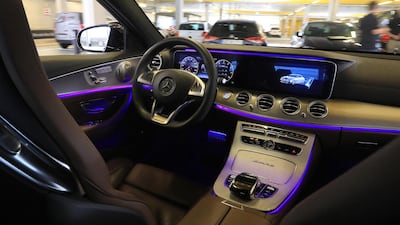France's Thales opened a Cyber Hub in Dubai in April. Roger Daix, vice president of Thales Middle East, tells The National about cyber-security risks associated with driverless cars.
How big of a concern is cyber security in the autonomous vehicles industry for the UAE and the region?
The digital transformation and the shift from connected cars to self-driving vehicles are key concerns for this fast-changing industry, which is expected to introduce major innovations in cybersecurity over the next few years – in particular in the UAE, where plans include the introduction of autonomous vehicles by 2020.
Connected vehicles provide drivers with impressive new functions, but the growing connectivity of embedded components make IT systems more vulnerable to cyberattacks. The digital transformation of the automotive industry is a game-changer. This context makes it critically important for end-to-end cybersecurity to encompass everything from embedded electronic components to the whole ecosystem of vehicles, users and road transport infrastructure.
How will cyber-security requirements shape the future of autonomous vehicles?
Intelligent transport systems are the way of the future, and while they offer infinitely greater possibilities, they also bring to light many more vulnerabilities. Cybersecurity will be the decisive component in addressing this, helping to deliver the technology safely and securely, as well as providing a means to combat and pre-empt any future risks.
To address this challenge, Thales recently established a joint venture with Vector, the Stuttgart-based specialist for automotive embedded electronics. By combining our expertise in aviation safety and automotive software, our aim is to offer a single platform that will run the car’s software and applications, whilst strengthening its cyber-protection.
New vehicles will progressively be equipped with our solutions between now and 2023.
What is the level of cyber-security spend in the the world?
The Thales 2018 Data Threat Report shows 78 per cent of global organisations plan to increase their spending on IT in 2018, compared with 73 per cent in 2017.
On the downside, security breaches are up – and sharply so. More than a third of global firms were breached last year, up from 26 per cent in 2017. More than two-thirds (67 per cent) of global organisations have experienced a breach at some point.
________________
Read more:
Fear of robot cars soars after crashes
Japanese start-up taking robots to the next level
________________
How big of an opportunity is the business of cyber security in the Middle East for a global company like Thales?
From AI and cloud technology, to AV, Dubai is leading the charge. However, this also means more exposure to risk and this is something Thales can help to address.
Recent reports suggest that the Middle East is especially vulnerable to large-scale cyberattacks, so security in this region is a major priority, especially as we approach Expo 2020. The new Cyber Hub will establish a centre of excellence for cybersecurity in the region, to bolster against these vulnerabilities. It will harness Thales's local expertise and use established world-class methodologies, as well as cyber training, simulation and threat intelligence to drive awareness and implementation of best practice in the region.
The Cyber Hub will also partner with local start-ups and leading academics, to embed the Hub as an integral part of the local start-up and incubator ecosystem, and ultimately boost the local landscape to benefit the Middle East’s digital transformation as a whole.


